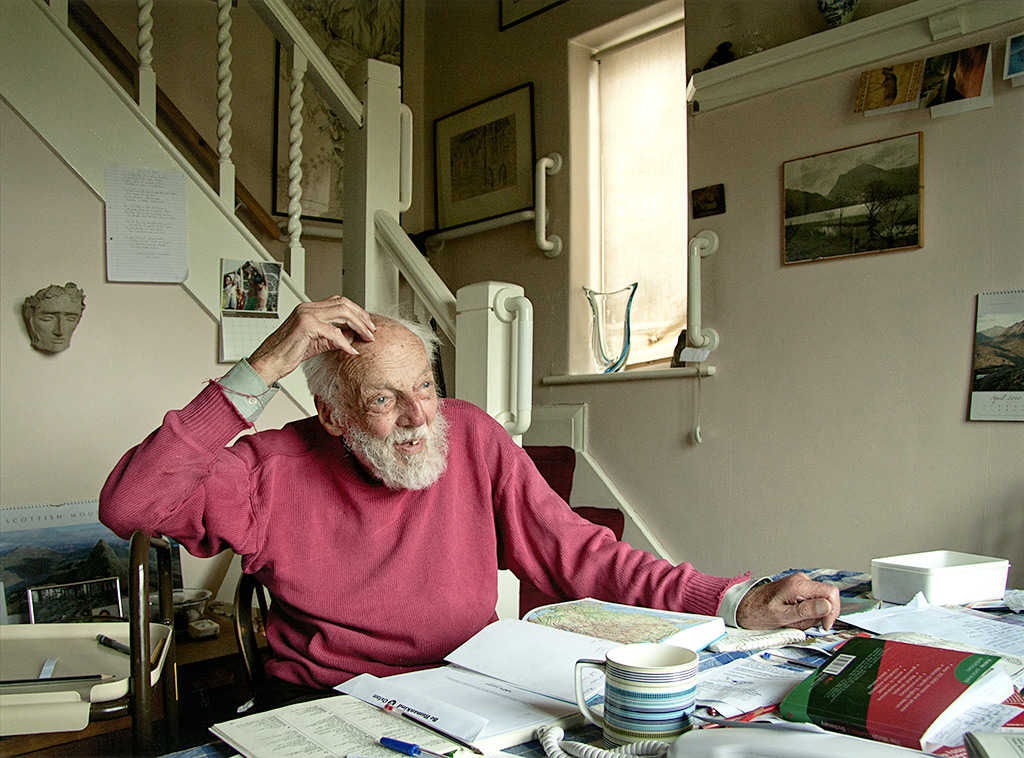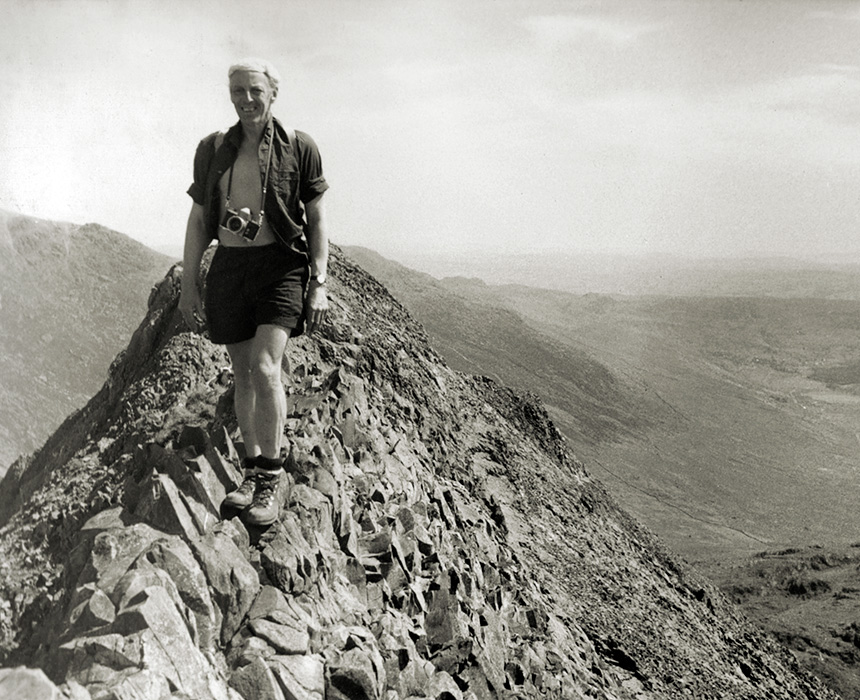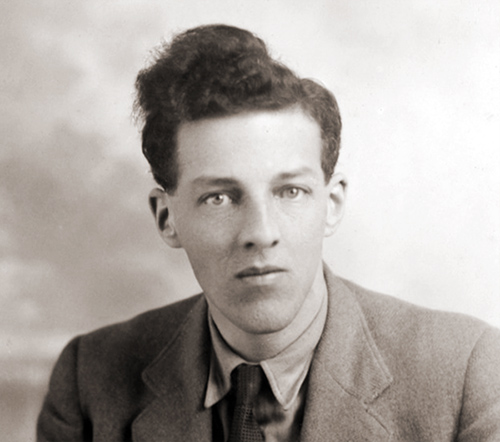Kenneth Taylor
Thomas Kenneth Taylor, my father, died aged 93 on June 7th, 2011. Kenneth survived his wife Françoise by four years and a few months. Françoise Taylor died aged 87 on January 24th, 2007. Ken and Françoise were married in Brussels in 1946 and had five children.
Click picture to enlarge

Ken Taylor circa 2010 (photo Geoff Davies, Bolton)
His son Anthony's tribute at Ken's funeral in Bolton on 17th June, 2011:
"My dad was born on the 31st of March, 1918. He shared his birthday with his favourite composer, Joseph Haydn. He was the eldest of 6 children to be followed by his sisters Nancy, Margaret, Joyce and Joan and his brother Michael. He was educated at Bolton School where he was made head boy of the Junior School. He used to joke with us he probably only got this honour because the headmaster wanted to join the golf club where our grandpa was chairman. I'm not sure if this was true, perhaps he was just being modest.
"As a boy, he joined the scouts where he first discovered his love of the outdoors and camping. He climbed his first mountains. He finished the sixth form with a Higher School Certificate, including French and German, the first of various foreign languages that he learnt to speak during his life. As teenager grew into young man, he was developing his distinctive unconventional and non-conformist approach to life. One of his mentors was Alfred Walker, his piano teacher who became a great influence on dad and encouraged him to nurture his great enjoyment of classical music which grew to be one of his abiding passions. He was finding his own path, thinking out his own philosophy, working out his own moral values. He particularly cherished individual freedoms. He was the classic liberal thinker and he never lost that.
"When war broke out in 1939, he was expected, like all young men, to join the army. But he soon realised it was wrong for him. He became a pacifist and had to go to court to plead his case as a conscientious objector in front of a judge. It didn't go down well with his parents and it took a lot of courage to follow his conscience at that time.
"Three years into the war he had a change of heart and volunteered for the army, becoming an officer in the 6th Green Howards. He was soon marching up and down the parade ground at Sandhurst, but at heart he was still the same old rebel. One funny example is when on a cold morning, they were doing their marching drill. During the inspection, the seargent found my Dad had kept his pyjamas on under his uniform to keep him warm. He got in a lot of trouble but perhaps that's what he was after.
"Then early on the 6th of June 1944, he was one of the first British soldiers to land on the Normandy beaches and he witnessed war at first hand, seeing friends and comrades killed around him. He never really enjoyed army life, it didn't match his free spirit and he found a release by keeping a secret diary, strictly against army rules. In it, he describes the horror of war but it is also full of the reflections and sensitivities of a cultured and free thinking young man. I would like to invite his eldest grandson Thomas to read an extract from the diary.
Sunday 13 August, 44. Our 25 pounders made such a noise last night that it got on my nerves and I could hardly sleep. The enemy seems to be pulling out today as he is not worrying us much. It is a good job as we could not have stood much more of that. Men are being evacuated in considerable numbers in a state of nervous exhaustion. I went to sleep in the afternoon in the lovely hot sunshine and woke up to find that we were being taken into reserve for 3 days rest. As the evening mellowed this realization and the cessation of the enemy shelling gradually allowed the spirit to unclamp itself and feelings other than fear and horror to return. Almost at last light I enjoyed hearing some hymns sung on the wireless, and then unexpectedly the most marvellous thing happened.
My incredulous ears perceived the slow movement of the Eroica just beginning. Nothing else could have satisfied me quite so much at that moment and my reaction to it dwarfed any other musical experience I have ever had. Surrendering oneself to the Eroica at such a moment was to experience the limit of human feeling. My soul had been torn to shreds during the last few days by all that was grotesque and horrible and here its elements were being washed, soothed, reawakened, and integrated again by the work of someone whose perceptions and sympathies were deeper than those of any other human being. Had a letter from Norma.
"As the war was finishing, he got his chance to speak French when he became a liaison officer for the Belgian army. This is how he first met a pretty young Belgian art student called Francoise Wauters. They found they were kindred spirits; they fell in love and were married within a year. He brought her back to Oxford where he had a place at the university to study philosophy, politics and economics. He loved the study of philosophy, the discussing and sharing of ideas with brilliant minds. He taught my mum English by reading her classic books from English literature, starting with Alice and the Jabberwocky. He would read to her, 'come to my arms my beamish boy' and 'Beamish' became her special name for him.
"It was in Oxford that Patrick was born and then they moved to Bolton where the rest of his children were raised. Dad got in trouble when Martin was born. For once in his life, Martin was early. Martin appeared before the medical team could get there and Dad actually had to deliver him. And then when the nurse arrived, she found Dad smoking a cigarette to calm his nerves and gave him quite a telling off and sent him out of the room. I'm sure he forgave her.
"Most of his working life was spent at the family business; W.T.Taylor & Co Ltd, where he became managing director. He always said one of the great pleasures of work at the mill was being with his brother Michael and his cousin Jack. They made a great team.
"But outside work, he lived his life to the limit, filling it with interests. He took wonderful photographs and spent many happy hours in his dark room printing his black and white pictures which became a lasting record of those years. He entered the Manchester Lensmaster Competition at Belle Vue Circus and won 1st prize and they awarded him a huge silver cup. He was very embarrassed about this and tried to sneak it into the house through the backdoor without us seeing. He was never one for honours.
"And then music, he had such a love for it. He learnt to play the cello and encouraged us to discover the beauty of classical music, particularly string quartets; Mozart, Schubert, Beethoven and of course Haydn.
"And then those mountains. He adored them. And many of his happiest moments were spent in the Lake District, in Snowdonia and in his beloved Scottish Highlands. What a catalogue of achievements. He climbed all the 14 Welsh '3000s' in a single day. With mum, he walked the Pennine Way twice, he completed three traverses of the Cuillin Ridge on the Isle of Skye and on one of these, he nearly lost his life as he slipped and fell only to be saved by his trusty nephew Rob. And the crowning glory, he climbed all 270 Scottish Munros which he only started at the age of 55, finishing on Ben Lomond with Mum, when he was 71. He always said he wanted his ashes to be buried in the hills when he died. And so they will be, next to the cairn he built at Two Lads near Rivington Pike, where his beloved Francoise's ashes are already waiting for him.
Click picture to enlarge

Ken on Crib Gogh, Snowdonia, Wales (mid 1970s)
"When the hills got too much of a struggle, he took to cycling and come rain or shine, he would do his ten miles each day. Aged 84, he rode the Commonwealth Games road race course around Rivington, to raise money for his favourite charity Oxfam and he was still cycling when he was over 90.
"He had his home hobbies. He loved foreign languages and having learnt French, German, Spanish and Italian, he decided a few years ago to learn Welsh. It's a really difficult language but he persisted with it none the less and visitors to 49 Stapleton Avenue would find scribbled welsh words written on envelopes and pieces of paper all over the house.
"He was fascinated by words and used language so eloquently. It was this love of language that led him to poetry. He had a phenomenal memory and could recite poems learnt years ago word for word. Michael put it well when he told us last week, 'when other memory was difficult for him, his favourite poetry, once prompted, would pour forth line after line and his eyes light up with pleasure'. Finally life became a real struggle for him, but he was the gentlest and tenderest of carers to Francoise in her final years. He was totally devoted to her. Then after she died, it was his turn to be looked after by his children and by Joan, Margaret and Michael and his loyal friend, Geoff.
"What a life he led. What energy. What vitality. What persistent determination. What humanity. He never lost his curiosity for the people around him and always took an interest in their lives. He was an inspiration to all who knew him. He was the jolliest of grandfathers to his nine grandchildren. The perfect father to his children. He was our idol, and the most loving husband to our Mum. For me, he never grew old and he never will."
Information about Kenneth Taylor from the archives of Bolton School Boys' Division
(THOMAS) KENNETH TAYLOR (at school 1926-1935)
Born 31 March 1918, Kenneth entered Bolton School as a member of Beech House in September 1926, having previously been educated at Broomfield. He was the son of John and Emmie Taylor and the family home was at Earlesmere, Heaton, Bolton. John Taylor ran a very successful towel manufacturing business, known as W T Taylor & Co. Limited, that was based at Victoria Milll, Horwich.
Kenneth was active in the life of the School and was particularly interested in Music. He represented his House (Wigan) in Cricket, Swimming, Gymnastics and Physical Training. He attended the School Camp at Aber in 1931 and there is also reference to him taking part in a debate to oppose the motion that "This House would welcome the reception of a School aeroplane shed" in February 1931. The motion was defeated by 22 votes to 14. He was also a keen member of the Scout Troop.
His father advised the School in January 1935 that he had decided that Kenneth should not go to Cambridge but rather go to Manchester University for a four year course in Textile Industry and Industrial Management. He left school in 1935, having done very well in the Higher School Certificate, with Good standard in French and German and Principal standard in History.
It is not clear whether or not Kenneth did attend Manchester University but he had begun working in the family business before the outbreak of war. After the war he decided to go to University and in June 1946, by which time he was Captain Taylor, he applied for admission to Jesus College, Oxford, having sought a reference from Bolton School. He wrote in a letter that "the people in England have a greater need for better ideas than better towels".

Kenneth Taylor in 1946, aged 26
He was interviewed at Jesus College by the Principal Sir Frederick Ogilvie and some of the tutors. He was accepted for admission in January 1947 and it is suggested he read PPE.
Kenneth attended an Old Boltonian lunch at Jesus College, Oxford in 1949 but he is not mentioned again until 1959 when he and W T Taylor & Co. Limited very generously presented an Arab crown folio platen press to the School Art Department, which enabled them to introduce a new craft – Typography.
He became a Governor of Bolton School in June 1965 before resigning with effect from 30 March 1988, on reaching his 70th birthday. The 3rd Viscount Leverhulme, Chairman of Governors, extended the thanks of the Governing Body for his many years service to the School.
Kenneth's wife Francoise Taylor was an eminent artist and was Head of Art at Mount St. Joseph's School, Farnworth, Bolton. According to Wikipedia she taught there between 1969 and 1982. However, in a Bolton Evening News article that was written after she died in 2007, it is said that she was Head of Art at Mount St. Joseph's between 1972 and 1983. Perhaps she was teaching at the School for three years, before being appointed Head of Art.
There are three references to Francoise in the Girls' Division Magazine. The first was in 1964 which refers to an Art Exhibition, showing an exciting variety of pictures by three local artists, being Francoise Taylor, Carolyn Stafford and Hugh Shuttleworth. In the same year there is a report of her donating one of her pictures – "Horses" – to the School.
With thanks to Bolton School.
« My English ancestors | Family »